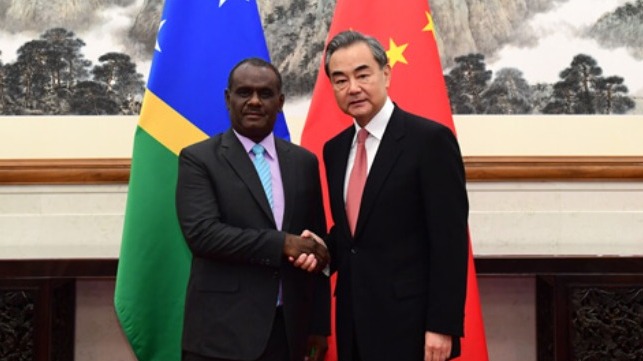China Falls Short on Regional Security Deal for the South Pacific

Months after the announcement of a security agreement between China and the Solomon Islands, China proposed a broader cooperation deal with 10 of the island nations in the South Pacific – and failed to secure their approval.
The deal was contained in a draft five-year action plan sent by Beijing to 10 Pacific Island nations ahead of a tour by China’s Foreign Minister, Wang Yi. Some of the themes include maritime cooperation, cyber security and education exchange program for over 2,000 workers and young diplomats from the Pacific.
However, the proposal ran into headwinds in advance of the tour. Last week, in a letter sent to 21 countries in the Pacific Rim, President David Panuelo of the Federated States of Micronesia sounded an alarm.
“The documents reflect an effort by China to acquire access and control of our region. The regional agreement includes language requiring that Pacific Island countries abide by the ‘One China’ principle. Granting China greater access to the seas, lands, customs systems and digital networks of our countries could increase chances of China invading Taiwan and going to war with the United States, Japan, Australia and New Zealand,” argued President Panuelo.
Wang Yi’s tour began last Thursday in Solomon Islands, and continued Monday with a visit to Fiji for a regional summit. After the meeting, Wang Yi acknowledged that more discussion would be needed before a formal agreement, though he said that cooperation would continue on matters of shared interest. “China will release its own position paper on our own positions and propositions and cooperation proposals with Pacific island countries,” he told media in a briefing Monday.
Australia, the US, Japan and New Zealand share a common concern that China’s primary interest may be to create a stronger military foothold in the Pacific.
Wang Yi’s visit comes days after a high-profile meeting of the Quad nations (the U.S., Japan, Australia and India) in Tokyo. The topic of China’s growing influence in the Pacific headed the agenda.
A strategic foothold
Some analysts argue that the deal with the Solomon Islands might have given China a window of opportunity to seek wider control of the Pacific Islands region.
But there are also signs that the bold approach could backfire. Notably, the regional draft communique shows a number of shifts in China’s vision for the Pacific, according to a recently-published analysis by Dr. Anna Powles, a Senior Lecturer in Security Studies at Massey University in New Zealand.
First, the deal aligns economic cooperation with security cooperation. Thus, it creates a dilemma for Pacific countries seeking economic partnership with China. The deal proposes creation of China-Pacific Islands Free Trade Area, which appears as a strategy to enhance China’s “security stakeholder status” in the Pacific.
Second, there is an apparent shift from bilateralism to multilateralism. The communique’s action plan states that China will appoint a Special Envoy for Pacific Island countries. The aim is to enhance China’s strategic cooperation at a regional level. Notably, it would help align the Belt and Road Initiative with the Pacific Islands Forum’s 2050 Strategy for the Blue Pacific Continent.

that matters most
Get the latest maritime news delivered to your inbox daily.
Third, China wants more access to Pacific’s maritime domain. Specifically, China is seeking to expand its strategic interests in the Pacific for commercial fishing purposes.
“For example, China has majority fishing rights in Kiribati and when foreign minister Wang Yi visits this week it is widely expected that a series of fisheries deals will be signed,” noted Dr. Powles.
